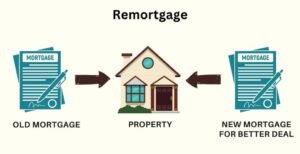
Remortgaging can be a useful financial tool, offering the potential to save money, access extra funds, or secure a more flexible mortgage deal. However, like any financial decision, it’s crucial to understand the potential downsides before diving in. Let’s explore both the benefits and risks of remortgaging, using clear examples to help you decide if it’s the right move for you.
The Sunny Side: Potential Benefits of Remortgaging
-
Saving Money on Monthly Repayments: If interest rates are lower now than your current mortgage interest rate, or if you’re on a more expensive variable rate, then remortgaging can be a cost-effective move. Securing a lower interest rate through remortgaging can significantly reduce your monthly outgoings. Imagine you have a remaining mortgage balance of £150,000 with a current interest rate of 4.5%. Remortgaging to a deal with a 3% interest rate could save you roughly £75 per month!
-
Accessing Additional Funds: Some remortgage options allow you to borrow extra money on top of your existing mortgage balance. This can be helpful for financing home improvements, consolidating debts, or simply increasing your financial flexibility.
-
Switching to a More Suitable Mortgage Deal: Your financial needs might change over time. Remortgaging allows you to switch to a mortgage deal with features that better suit your current situation, such as a fixed-rate mortgage for stability or a repayment vehicle with an offset account for increased flexibility.
The Potential Risks of Remortgaging
-
Higher Overall Costs: While remortgaging can lead to lower monthly repayments, there are associated fees such as valuation fees, legal fees, and potentially an Early Repayment Charge (ERC) if you’re breaking a fixed-term deal with your current lender. These fees can add up, so ensure the potential savings outweigh the costs.
-
Extending Your Mortgage Term: If you remortgage to a longer term, it might take you longer to pay off your mortgage and accrue more interest overall. While the monthly repayments might be lower, the total interest paid will be higher in the long run.
-
Risk of Increasing Your Debt Burden: If you access additional funds through remortgaging, you’re essentially increasing your overall debt. Ensure you can comfortably manage the higher monthly repayments associated with the increased loan amount.
-
Potential for Negative Equity: Property values can fluctuate. If you remortgage and borrow additional funds to the maximum available, should the value of your property decrease, you could end up in a situation where the outstanding mortgage balance is higher than the current market value (negative equity). This can limit your remortgaging options in the future.
When is Remortgaging Most Appropriate?
-
Your Current Interest Rate is High: If you’re on a high interest rate or variable interest rate mortgage deal, remortgaging to a lower rate can lead to significant monthly savings.
-
Your Financial Situation Has Improved: If your income has increased or your credit score has improved, you might qualify for a more competitive remortgage deal.
-
You Need Access to Additional Funds: If you have a specific financial goal in mind, such as a home improvement project, remortgaging can be a way to access the necessary funds.
When to Think Twice About Remortgaging
-
You’re Planning to Sell Your Home Soon: The remortgaging process can take time and involve fees. If you plan to sell your home soon, these costs might not be worthwhile.
-
Your Financial Situation is Unstable: If you’re unsure about your future income or have concerns about managing higher monthly repayments, remortgaging with additional borrowing might not be the best option. It may be appropriate to consider a remortgage to switch to a more suitable deal, so long as it will be affordable for you for the foreseeable future.
-
You’re Already on a Competitive Interest Rate: If you’re already on a good mortgage deal, the potential savings from switching might be minimal, and the fees involved might outweigh any benefits.
The Bottom Line: Remortgaging Can Be a Smart Move, But Weigh the Risks
Remortgaging can be a valuable tool, but it’s not a one-size-fits-all solution. Carefully consider your financial goals, risk tolerance, and current mortgage situation before making a decision. Consulting with a qualified mortgage broker can help you explore your options and navigate the remortgaging process with confidence.
If you’re considering a remortgage, our mortgage team can help you:
- Assess the potential benefits and risks of remortgaging for your specific situation
- Compare remortgage deals and find the best option for your needs
- Guide you through the remortgaging process with clarity and expertise
Contact us today for a no-obligation consultation and unlock the true potential of your homeownership.






